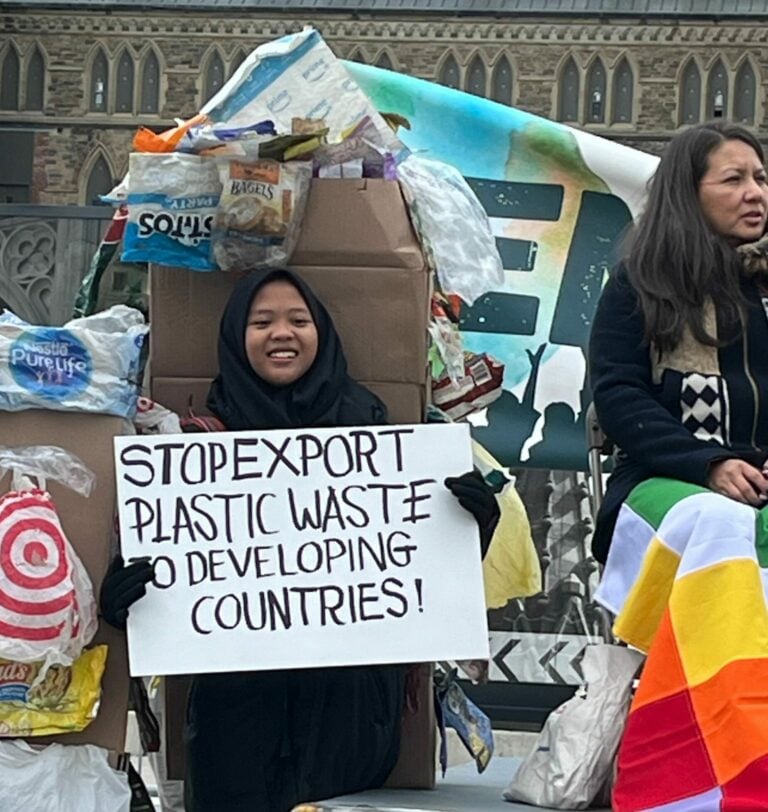Earth Day Declaration: Groups Urge Bold Action to Strengthen the Global Plastics Treaty
By: Waterkeeper Alliance

Today, in honor of Earth Day, a diverse group of 54 organizations from 24 countries across North and South America, Africa, Europe, Asia, and Australia joined forces to submit a declaration ahead of international negotiations on a global treaty to end plastic pollution. The United Nations Environment Programme’s Intergovernmental Negotiating Committee is meeting in Ottawa this week for session four, or INC-4, to hammer out agreements on the text of the emerging treaty. Building on the official Earth Day 2024 theme, Planet vs. Plastic, the declaration recognizes the historic role of this effort as a catalyst for change, and urges strong action to limit pollution across the full lifecycle of plastic production, usage, and disposal.
The declaration implores delegates to go beyond false solutions such as an over-reliance on inefficient and misleading plastic recycling narratives that do not address the source of the impacts to human health and the environment. The groups also emphasize that only through reduction, prevention, and expanded product reuse systems will society make progress on this growing global problem. In particular, the coalition makes clear that any agreement on reducing plastic pollution must include enforceable reductions to plastic production, which is now shown to be one of the most important ways to reduce harm from plastic.
Other aspects of the declaration include calling for a human-rights approach that centers the needs and voices of highly impacted communities, including Indigenous Peoples, workers, youth, and fenceline communities often located near production, incineration, and disposal facilities. The declaration emphasizes the need for mandated extended producer responsibility systems to hold producers of plastic products and their precursors accountable across the supply, production, and disposal chain, as well as an overhaul of waste management systems to reduce harm from plastic leakage into the environment. This action comes amid startling revelations about human health harms from plastic pollution and growing recognition that international waste trade, fossil fuel extraction, and petrochemical production make this a truly global problem.
The mandate for an international treaty process began with the UN Environment Programme’s Resolution 5/14 End plastic pollution: Towards an international legally binding instrument, approved at its 5th Assembly (UNEA-5.2) in 2022. The parties expect to complete the process later this year with the conclusion of negotiations at INC-5 in Busan, South Korea.
Today’s declaration comes on the heels of a historic March to End the Plastic Era yesterday in Ottawa, which saw an estimated 500 participants from all around the world calling on negotiators to conclude INC-4 with a strong, just, and equitable treaty.
In conjunction with the declaration, stakeholders issued the follow statements ahead of this week’s INC-4 meeting:
“Clearly the crux of the plastic pollution crisis is too much plastic being produced,” said Chris Wilke, Waterkeeper Alliance.“There is no way to recycle our way out of this. We must face the fact that plastic and petrochemicals, at current production levels, endanger waterways, communities and fisheries across the globe. Cutting production and implementing non plastic alternatives and reuse systems is essential.”
“Every single day we fail to commit to reducing unnecessary plastic pollution is another day we’re prioritizing industry profit over the health of our people and our planet,” said Jennifer Savage, Surfrider Foundation. “With every false solution being offered, the plastics industry is, in truth, treating the Earth itself as something disposable.”
“We must lead with security, protection, and safeguards for human health and the environment. If we don’t, we will never succeed in negotiations,” said Frankie Orona, Society of Native Nations. “We cannot go from one extractive industry to another. We must cap production and phase out and away from petrochemicals, our communities are getting sick and people are dying. I ask that we bring humanity to these negotiations before it’s too late for all future generations.”
“Communities all over the world, like my community in Louisiana, are suffering from the crippling impact of plastic production, an industry rooted in the plantation system that enslaved my African ancestors,” said Jo Banner, The Descendants Project. “Just as in slavery, we are now experiencing an international human rights crisis as descendant communities face extreme risks of cancer and other diseases. It is time we break the chains of plastic by capping its production so that residents in Cancer Alley, and other fenceline communities can finally be free to live healthier and happier lives.”
“Simply put, we need a UN Plastics Treaty that limits plastic production, ends production of toxic chemicals, and supports frontline communities most impacted by petrochemicals and plastic production. Recent surveys in the U.S. and globally show that more than 80% of people are supportive of reducing plastic production—which is the key solution to addressing plastic pollution and its related injustices. Real solutions exist today: We need leaders to support plastic-free, nontoxic reuse, refill, repair, share, and regenerative systems that end wastefulness at the source,” said Jen Fela, Vice President of Programs and Communications, Plastic Pollution Coalition.
“A rapid transition to non-toxic, affordable and equitable reuse and refill systems is critical to achieve the intended outcomes of the Global Plastics Treaty,” said Alejandra Warren, Plastic Free Future. “However, the systemic changes needed to shift away from single use plastics are highly unlikely to occur if they rely solely on voluntary efforts from the industries and consumer goods companies that heavily rely on toxic single use plastics. Codifying requirements for toxic-free reuse and refill systems is the only sensible solution to reduce waste generated by single use plastics, accelerate a just transition and protect Indigenous and traditional reuse systems.”